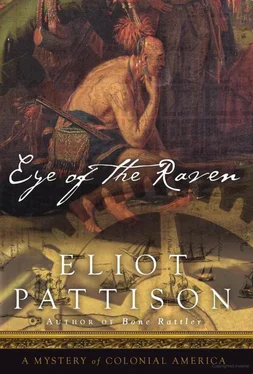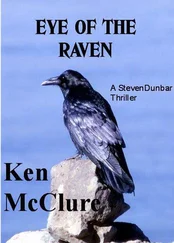Eliot Pattison - Eye of the Raven
Здесь есть возможность читать онлайн «Eliot Pattison - Eye of the Raven» весь текст электронной книги совершенно бесплатно (целиком полную версию без сокращений). В некоторых случаях можно слушать аудио, скачать через торрент в формате fb2 и присутствует краткое содержание. Год выпуска: 2010, ISBN: 2010, Издательство: Counterpoint Press, Жанр: Исторический детектив, на английском языке. Описание произведения, (предисловие) а так же отзывы посетителей доступны на портале библиотеки ЛибКат.
- Название:Eye of the Raven
- Автор:
- Издательство:Counterpoint Press
- Жанр:
- Год:2010
- ISBN:9781582437019
- Рейтинг книги:5 / 5. Голосов: 1
-
Избранное:Добавить в избранное
- Отзывы:
-
Ваша оценка:
- 100
- 1
- 2
- 3
- 4
- 5
Eye of the Raven: краткое содержание, описание и аннотация
Предлагаем к чтению аннотацию, описание, краткое содержание или предисловие (зависит от того, что написал сам автор книги «Eye of the Raven»). Если вы не нашли необходимую информацию о книге — напишите в комментариях, мы постараемся отыскать её.
Eye of the Raven — читать онлайн бесплатно полную книгу (весь текст) целиком
Ниже представлен текст книги, разбитый по страницам. Система сохранения места последней прочитанной страницы, позволяет с удобством читать онлайн бесплатно книгу «Eye of the Raven», без необходимости каждый раз заново искать на чём Вы остановились. Поставьте закладку, и сможете в любой момент перейти на страницу, на которой закончили чтение.
Интервал:
Закладка:
Duncan lifted one of the lanterns from its hook and held it closer to one of the remaining doors. A fetid smell wafted from the cell. A man growled, and another spat a curse as if Duncan was disturbing them. He moved to the next cell. The same rancid smell came from its hatch, but so, too, did a faint scent of cedar.
He gave a low call, the whistle of a warbler, that brought movement in the shadows. "Jiyathondek," he whispered twice in the Iroquois tongue. Hearken. Listen. "It is Duncan. Conawago is close."
The chiseled face of the chief appeared in the dim light. Skanawati nodded in greeting. "Niyawenhkowa kady nonwa," he said. Great thanks that in safety you have come through the forest. "Lamentable would be the consequences had you perished," he continued in an untroubled, solemn voice.
To Duncan's surprise, he recognized the words. They were from the traditional Edge of the Woods ceremony, in which Indian travelers greeted each other after traveling far to meet. He struggled to recall the words of response that Conawago and the rangers had taught him. "I have seen the footmarks of our forefathers," he recited after a moment. "All that remains is the smoke of their pipes."
For the first time since Duncan had known him, Skanawati smiled, then nodded his approval. "It is true, then," the Onondaga observed, "the forest is entering your blood."
This is absurd, something shouted inside Duncan. There is so much to ask, so many mysteries to penetrate, and we are acting like we are picking berries in the wilderness. But he found himself smiling back. "True enough," he acknowledged, then quickly added, "Marston is upstairs. He helped me."
Skanawati nodded again. "You must let them know back in our country that he is no enemy."
"There are other killers, Skanawati," Duncan blurted out. "I am gathering the truth."
"Truth?" the Indian asked. He grew silent, studying Duncan. "The truth is I want all surveyors to be gone from the world. They are always the beginning of the end for the land spirits."
"Men are not hanged for the sins nurtured in their hearts, only the sins committed by their hands." As he spoke Duncan looked behind him, thinking he heard the stairs creak. He lifted the lantern along the frame of the door, looking for a key. To his surprise, he found one, hanging on a post in the center of the corridor.
Skanawati hesitated when Duncan opened the cell door. He took only two small steps and lowered himself to sit on the floor against the wall. Duncan handed him a piece of sausage, brought from Marston's kitchen, half of which the chieftain consumed before stuffing the remainder inside his soiled waistcoat.
"Tell me something, Scotsman," Skanawati asked. "Is it daylight out?"
The question brought an unexpected ache to Duncan's heart. "It is early afternoon."
Skanawati nodded.
"I wish to understand about your uncle, the last chief. Why he would kill the surveyor Townsend. Was it because he knew of Townsend drawing a map? A great chief does not kill for no reason."
"The map had been destroyed by then," the Onondaga said. "It was an old feud. His wife and her family, all his children, were killed by Huron and French raiders many years ago."
"But Townsend was not French."
"My uncle often wore a scarlet soldier's coat. He had been given a medal from the English king when he was younger, for fighting for him in one of the wars."
Duncan struggled to make sense of the words. "You mean Townsend was with French that day?"
Skanawati nodded. "My uncle found them at the marker tree, saw how Townsend and the French Indians laughed and drank together. Above all, he hates traitors. It had been traitors, English trappers paid with French gold, who had led the raiders to his village all those years ago. He swore blood vengeance on all such men."
Duncan paced in front of the Onondaga, straining to connect Skanawati's revelation to the murders. "Who would know of your uncle's feud?"
"It was no secret."
"But why was he there that day, just when Townsend was with the French Indians?"
"Some Shawnee came to him, told him he had found a traitor who needed to be stopped before he inflicted harm on the Iroquois. When I heard this I did not believe it. Townsend was not an evil man."
"And Townsend, did he have a guide?"
"A Delaware called Ohio George."
No doubt, Duncan realized, Townsend never knew the difference between French and English Indians, had drunk with the French Indians because they had been friends of his guide. The first murder had been an elaborate trap, a test as it were.
"Outside," the chief asked, "have you seen a large black bird?"
"I–I don't know," Duncan admitted. He noticed a water bucket, filled the ladle hanging on its side, and handed it to the Indian, struggling not to let his frustration show. He reminded himself that seldom were conversations with an Indian conducted in a straight line.
"This cell," Skanawati said after a moment, "it is like a cave. It makes me think of my father."
Duncan leaned against the post, realizing this was the most he had ever heard the man speak.
"I never knew my father much," Skanawati continued, "no one in the village did. He never stayed with us except sometimes during the sugar tree or green corn festivals."
Duncan thought he understood. "My father had many responsibilities as well."
"No. It wasn't like that. He lived alone, in the woods, in the manner of what you Europeans call a hermit, except he did it to be close to the forest spirits. My people have a name for a man like that. A wild deer."
"It can be difficult to be raised without a father."
"An Iroquois boy is raised by his mother's family, by his uncle," Skanawati reminded Duncan. "But I find myself thinking more and more of my father. Once in a winter when I was young, he came and stole me away against my mother's wishes, took me to a high cave where he was living, just as a terrible snowstorm arrived. The morning after the storm he took me to the mouth of the cave, where we could see for many miles. The world was white, everywhere, except for a single creature perched on an old dead tree nearby, a raven. My father said he always sat there after snowstorms, because it was a different world then, because in that world nothing moved for as far as a man could see but the eye of that raven. He said that bird was the most ancient of our gods. He said in all my life the most important thing to remember was that the raven was always watching me, seeing everything I did." Skanawati paused to drain the ladle. "I see him sometimes, flying high above."
"In your village," Duncan said in a tone of wonder, "there was a raven watching the ceremony of the dead."
Skanawati nodded, as if not surprised, then looked up. "Look to the trail behind," he declared abruptly.
Duncan paused, thinking the Indian meant he had missed something from their travels. Too late he heard the noise behind and spun about. The club slammed into the back of his knees first, so hard he collapsed onto the stone flags of the floor. Then he knew nothing but a storm of boots kicking his belly, his legs, his neck, his head.
The spirit fire. They were draining his life force, stealing the spark that kept him alive. The odd tingling sensation in his hand exploded into a hundred stabs of pain. His head shot up, and he looked directly into the face of Lord Ramsey.
Duncan twisted against his bindings, gradually becoming aware that he was back in the corner cell, suspended from the ceiling in the harness Marston used for his treatments.
"In Pennsylvania," Ramsey lectured his captive, "a man who escapes his indenture is a criminal. Worse, in the land of the Quakers, you are a sinner, for you have broken your sacred word."
"My indenture." Through his spasms of pain Duncan could manage only a few syllables at a time. "Is in the name of your daughter." He saw Marston now, slumped unconscious in a corner.
Читать дальшеИнтервал:
Закладка:
Похожие книги на «Eye of the Raven»
Представляем Вашему вниманию похожие книги на «Eye of the Raven» списком для выбора. Мы отобрали схожую по названию и смыслу литературу в надежде предоставить читателям больше вариантов отыскать новые, интересные, ещё непрочитанные произведения.
Обсуждение, отзывы о книге «Eye of the Raven» и просто собственные мнения читателей. Оставьте ваши комментарии, напишите, что Вы думаете о произведении, его смысле или главных героях. Укажите что конкретно понравилось, а что нет, и почему Вы так считаете.












